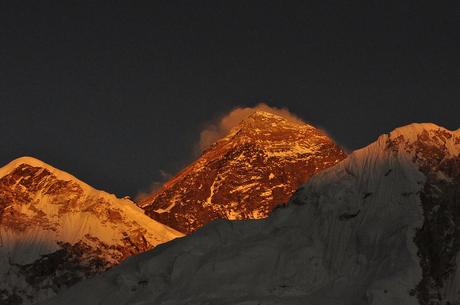 Nepal's Ministry of Culture, Tourism and Civil Aviation has put fourth a set of new regulations for climbing in the country with some big changes coming to the mountains. The governing body that oversee mountaineering in Nepal has already forwarded its recommendations to that nation's ruling body, the Council of Ministers where it is expected to be accepted prior to the start of the spring climbing season.
Nepal's Ministry of Culture, Tourism and Civil Aviation has put fourth a set of new regulations for climbing in the country with some big changes coming to the mountains. The governing body that oversee mountaineering in Nepal has already forwarded its recommendations to that nation's ruling body, the Council of Ministers where it is expected to be accepted prior to the start of the spring climbing season.
Amongst the changes are a complete ban on climbers who are completely blind or have had a double amputation. The regulations also call for a ban on those who have proven medically unfit for climbing as well, although exactly where that line is drawn remains unclear.
The move comes after former British Gurkha Hari Budha Magar announced his intention to climb Everest next spring. Magar lost both of his legs fighting in Afghanistan, but summited Mera Peak this autumn as a tune up climb for Everest. His story has already served as an inspiration to others across the world.
Other new regulations include a complete ban on solo attempts to climb Everest, with the regulation requiring all climbers to take at least one guide with them to the mountain. The Ministry has recommending a continued ban on any climber younger than 16 years of age, and is also requiring expeditions to carry at least 15 walkie-talkies rather than the current number, which stands at 12.
The ban on solo climbing on Everest will obviously impact very few climbers, but there is always someone who tries to give it a go each year. There are even rumors that Alex Txikon has been planning a return trip to Everest this winter to give his solo effort another go. Whether or not he'll actually get the chance to do that remains to be seen.
There is some good news from the new regulations. The Ministry is recommending that all sirdars, mountain guides, and high-altitude workers who accompany expeditions to the top of Nepal's climbing peaks – including Everest – should get a summit certificate. This has been a source of controversy amongst the Sherpas for some time now, as many have never been issued a summit certificate for their efforts in the mountains. That looks like it is about to change however, as these hard working support crews finally get the recognition they deserve. Receiving a summit certificate is a tremendous source of pride for these men and women, and not receiving them in the past as been a sore point.
There is no indication on when the Council of Ministers will rule on these new regulations, but it is likely to come ahead of the spring climbing season. That's when Hari Budha Magar was planning his attempt on Everest and this would effectively put an end to that. We'll have to wait to see whether or not these rules will be put into place, but this being Nepal, it seems highly likely.

